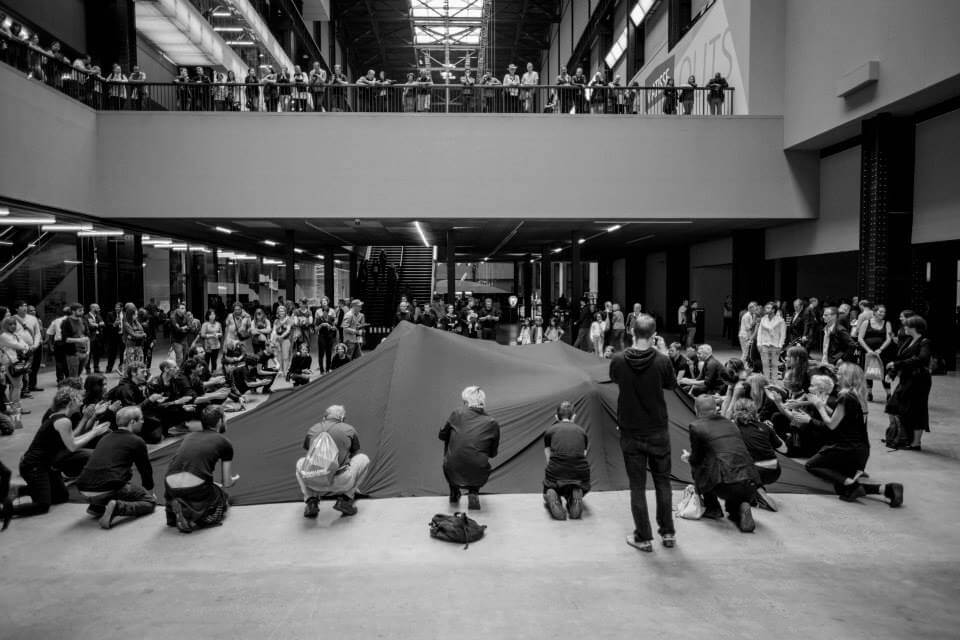
Tate is to appear before the Information Tribunal on Thursday 18 September in the culmination of an almost three-year long legal battle over its refusal to disclose information surrounding its controversial sponsorship relationship with oil company BP.
Tate has been subject to long-standing Freedom of Information requests regarding both the amount of money it had received in sponsorship from BP, and over the minutes of certain meetings where the renewal of BP’s sponsorship agreement had been discussed and ultimately approved.
In March 2014 the Information Commissioner ruled that Tate was breaking information law on several counts by refusing to remove redactions from sets of minutes from its Ethics Committee Meetings and the Tate Trustee meetings. Tate appealed against the Information Commissioner’s ruling, and will now appeal before the Information Tribunal in an oral hearing.
The Tribunal will also hear arguments as to why Tate should disclose the amount of money it has been receiving from BP. While campaigners have used existing information in the public domain to estimate that the amount Tate receives from BP only 0.4% of Tate’s overall operating budget, the exact figure remains unknown.
Tate’s refusal to disclose details over its BP sponsorship deal was the subject of an unsolicited two-hour performance protest last weekend in the Tate Modern Turbine Hall. Members of the art collective Liberate Tate unfurled a 64 metre square black cloth, a reinterpretation of Malevich’s Black Square exhibiting in the gallery referencing Tate’s use of black squares in redacting information that they have been ordered to reveal.
Kevin Smith, an oil sponsorship campaigner from Platform said:
“There’s a great deal of public debate surrounding Tate’s longstanding relationship with BP, a company associated with a long list of environmental, human rights and climate controversies. The debate about BP sponsorship often boils down to the question as to whether or not Tate could realistically replace BP’s sponsorship money through alternate sponsors or other revenue streams. By refusing to disclose how much money it is getting from BP, Tate is effectively shutting down this important public discussion.”
Rosa Curling, a solicitor from Leigh Day who has been working on the case said:
“Tate argues, for reasons of commercial confidentiality and sensitivities, the amount of money it receives from BP should be kept secret from the public. It states to disclose such information would set a “damaging precedent” and risk its chances of obtaining sponsorship from BP and other companies in the future. In fact, however, the opposite is true. It is Tate’s continued refusal to act in an open and transparent manner that is setting a “damaging precedent”.
Tate’s decision to accept money from BP has led to widespread criticism of the gallery. Many people argue that BP, with its history of environmental damage and human rights abuses, is an inappropriate sponsor for the arts. Tate, in response, suggests that BP’s sponsorship is crucial to its financial security. However, at the same time, it refuses to disclose the facts and figures which evidence this suggestion.
This secrecy cannot be allowed to continue. The Tribunal must now intervene and order the Tate to comply with its obligations under the Freedom of Information Act, and make public the amount of money it receives from BP without further delay.”
For more information or comment, contact [email protected] / 0207 403 3738
Hi Resolution photos or footage of Liberate Tate’s Hidden Figures performance are available from [email protected]
*** ENDS ***
Notes
1) The Information Tribunal Hearing over Tate and BP sponsorship is open to the public and will take place on 18 September, 10am at Court 7, Field House, 15 Bream’s Buildings, London, EC4A 1DZ
2) The legal challenge to Tate’s use of information law has been brought by Request Initiative working with Platfom. Their legal team consists of Rosa Curling, a solicitor from Leigh Day and the barrister Julianne Morrison from Monckton Chambers.
Platform is an NGO that combines art, research and education in projects that are often aimed at addressing the environmental and human rights abuses of the oil industry. You can find out more about its long-running campaign against oil sponsorship of the arts here: https://platformlondon.org/oil-the-arts/
Request Initiative is a Community Interest Company that uses information law in the public interest. It works on behalf of NGOs and charities who publish our disclosures in their research and the media https://requestinitiative.org/
Leigh Day is a specialist law firm with some of the country’s leading personal injury, product liability, clinical negligence, employment and discrimination, international and human rights teams.
3) The Information Commissioner’s ruling from March 2014 can be found here: https://ico.org.uk/~/media/documents/decisionnotices/2014/fs_50493468.pdf
4) The ‘less than 0.5%’ figure is derived from dividing BP’s £10 million sponsorship deal between four different arts institutions over 5 years, which represents less than 0.5% of Tate’s £157,281,000 budget in 2013
See the Platform research and infographic at https://platformlondon.org/p-publications/artoilinfographic/
5) Liberate Tate’s press release on their 6 September performance
A set of images from Liberate Tate’s Hidden Figures performance can be found at
https://www.facebook.com/media/set/?set=a.1510904642482159.1073741836.1420910848148206&type=1